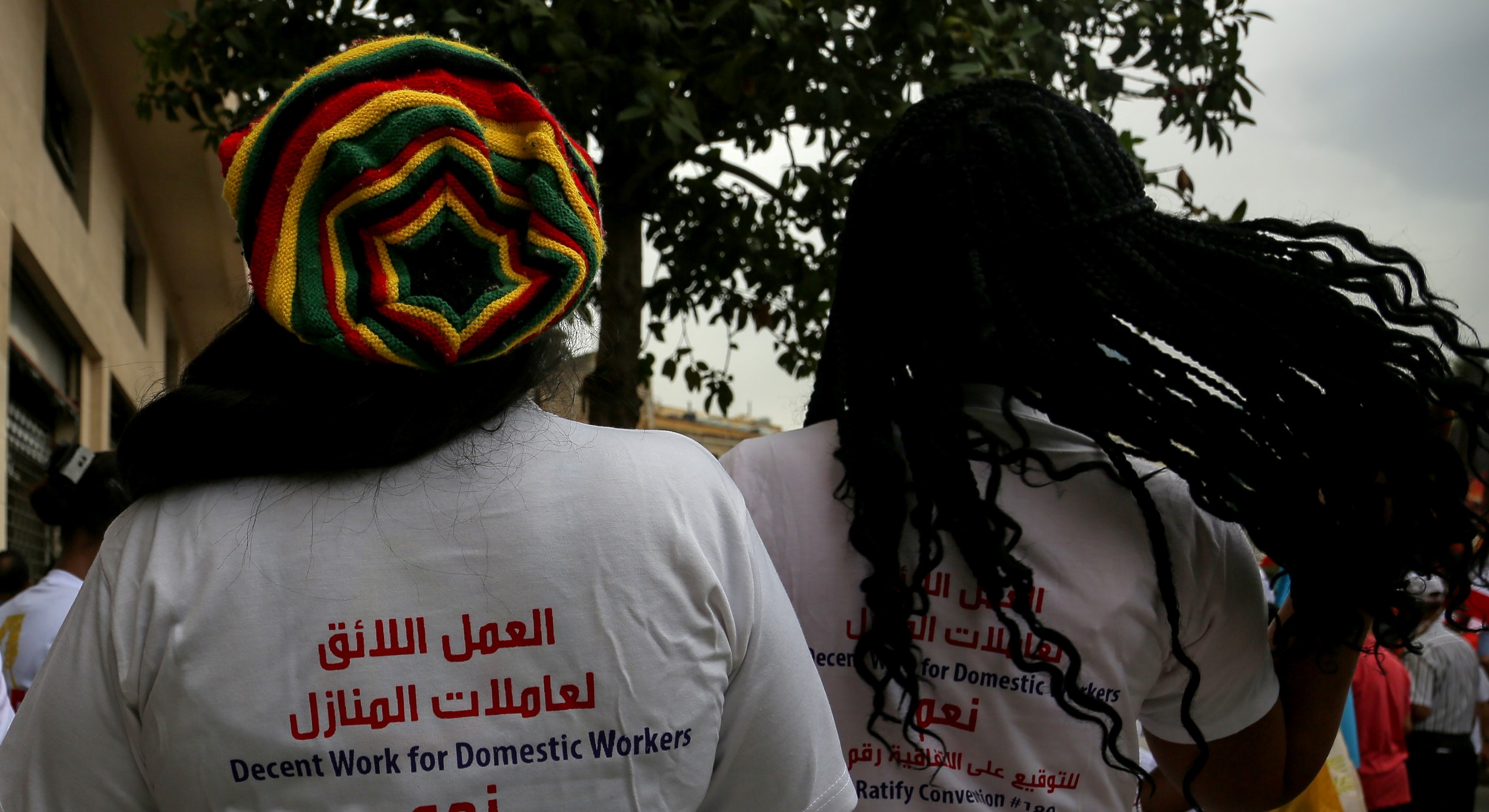
The Kafala System in Lebanon: Between Slavery and Domestic Labor Trafficking

The Kafala System in Lebanon: Between Slavery and Domestic Labor Trafficking - Leila Issa
How can we ignore a failed system, well-established and legislated by the authorities and normalized by society?
This issue is not only related to defending the rights of migrant and non-migrant domestic workers, but it is directly related to the effort our mothers have put into our households, as they have worked for years without vacations or rest, without any compensation or appreciation.
The Lebanese Labor Law does not adequately recognize this category of workers, and there is no specific law regulating or recognizing such work as a profession like other professions. In order to regulate such work, the sponsorship system was established (although Lebanese legislation does not include any regulation in this regard), as an alternative to the labor law in order to attract women from South Africa and West Asia. Recruitment offices categorize women and girls coming from those countries. The employers must select the worker "from the catalog" according to their own standards (this catalog describes the worker including details like bodies, religions, social status, and other) and thus the deal/trade is completed.
Subsequently, domestic workers are forced to sign contracts written in a foreign language that they do not understand or that do not accurately reflect their terms of employment, their vulnerable position and their need to work do not allow them to negotiate nor to stipulate. Domestic workers incur large debts to cover recruitment fees and travel expenses, therefore, recruitment agencies and employers put them under the pressure of debt bondage in order to exploit and control them.
In 2009, the Ministry of Labor issued a mandatory standard unified employment contract dedicated for domestic workers, but it has been criticized in several respects. It is exclusively available in Arabic language, and does not guarantee domestic workers the right to keep their passports. It does not protect them against arbitrary dismissal, although it does specify the reasons whereby a worker may terminate the contract, including the employer failure to pay wages for three consecutive months, if a household member assaults or mistreats the worker, or if a household member sexually harasses or assaults the worker, provided that this is proven through medical reports, police reports, or Ministry of Labor reports, and if the employer hires the domestic worker in another capacity without his or her consent. This means that if a domestic worker does not receive legal leave, and cannot prove the assault, and is not provided with access to adequate food and housing, none of these shall be considered sufficient grounds to terminate the contract. On the other hand, according to Article 13 of the standard unified contract, if the domestic worker commits a deliberate “mistake or negligence” (without specifying the nature of such a mistake or negligence) or an act that is punishable under Lebanese law the employer is entitled to terminate the contract. Despite the existence of this contract, female domestic workers remain excluded from the provisions of Lebanese Labor Law and remain under the control of the employer due to the sponsorship system, in particular, since the General Security prohibits foreign labor (and not only female domestic workers) from changing sponsorship without the consent of the competent authorities. However, the authority responsible for approving sponsorship transfers has not been clearly defined, in addition, the foreign labor is prohibited from transferring his sponsorship more than twice during his employment period in Lebanon.
Slavery System
Rights organizations have attempted to regulate the status of migrant workers by adopting a standard unified employment contract, but Lebanon’s State Shura Council, the country’s top administrative court, has delivered a sharp blow to migrant domestic worker rights by suspending the implementation of a new standard unified employment contract, The standard unified contract, adopted by the Ministry of Labor on September 8th, 2020, included new protections for migrant domestic workers, including vital safeguards against forced labor, and it could have been an important first step toward abolishing the abusive kafala system1.
The legal status of female workers is linked to their employers through the sponsorship system, and employers often withhold the female worker’s passport and personal documents, restricting her freedom and confining her to the house.
Many female domestic workers live in extremely poor living conditions, and their fate depends on the “goodwill” of their employers. These women are often confined to their homes, without phones, without identification papers, without vacations or rest hours, without any means of communication with the outside world, and without respect for their privacy. In addition, many of them are deprived of wages, and the main reason is that this work is expected to be free for women.
The slavery system has not ended, the legal and social system is rather entrenching it further, by placing the right to self-determination of the worker in the hands of the employer, being responsible for her working conditions, residence, and legal status. He does not allow her to leave her job or change her sponsor/employer, but rather leaves her vulnerable to all types of violations, exploitation, and violence without supervision or accountability. Even when she is subject to all types of violations, she remains shackled and under the control of the employer, who can prevent her from resigning, returning to her country, or changing her employment, without his consent, and according to his mood and desire.
Are we entitled to think that unpaid domestic work that women are forced to perform within households under the authority of men has reinforced the concept of the unpaid forced female labor? This is very common, as many of them have been deprived of their wages for years and were later deported without receiving their salaries. Here comes the next question: What is the difference between sponsorship and slavery?
In fact, these women are experiencing similar practices in households, except for physical and sexual assaults, which reflect the perception of domestic worker as commodity owned and purchased by the employer, and now it is at their complete disposal.
Failing to protect female domestic workers and failing to pass a law that recognizes their rights, denying their right to self-determination is a betrayal of all domestic workers, a betrayal of women, of mothers, and “housewives” who suffer from a lack of appreciation and respect for their efforts and hard work in care and domestic work.
Women's Labor Movement
Migrant domestic workers are still denied from their right to participate politically and to establish their own unions, and the state continues to deport and target migrant women because of their participation in community organizing and activismز
It is good to know that domestic workers, with the help of civil society organizations, have organized themselves and through their limited resources, they have sought for years, to advocate for the rights of all domestic workers in Lebanon, of all nationalities, in order to abolish the sponsorship system. They also organize awareness sessions for domestic workers coming from their countries to Lebanon, to better understand what they are coming for, and better realize the reality and conditions they will endure during their stay in Lebanon.
The movement led by domestic workers is considered among the largest women’s labor movements in Lebanon, which reminds us of a very important and main idea in this regard, that this issue is a feminist issue, and that employer’s practices against female domestic workers are nothing but a clear reflection of the domestic violations, aggressions and exploitation that are practiced against women in general.
1. Lebanon: Blow to Migrant Domestic Workers, Reinstate Contract, Amend Labor Law, Human Rights Watch, 2020.
This article is part of the special edition of ANND’s monthly newsletter for the month of July 2024. These articles were prepared by young men and women from the Arab Youth Network. The opinions and ideas expressed in these articles express the views of the authors and do not necessarily reflect the official policy or position of ANND.
About the Arab Youth Network:
The Arab Youth Network seeks to provide a regional platform for young men and women from different countries in the region to have their voices heard, enhance their engagement with various development and human rights issues, and engage in influencing public policy.
Recent publications

